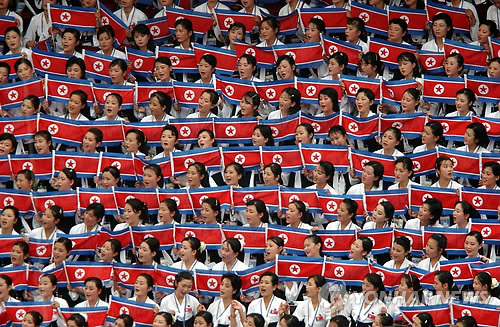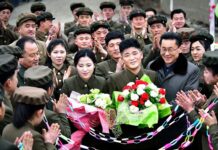 Image: Yonhap News Agency |
The United Nations Human Rights Council
held its 28th regular conference in Geneva, Switzerland, on the 2nd of this
month. John Kerry, the United States Secretary of State, delivered the keynote
address, wherein he stated, “In North Korea, tens of thousands of people
live as virtual slaves in 2015. Such atrocities cannot and should not be
condoned.“
Since the United Nations Human Rights
Council established a Commission of Inquiry (COI) to investigate systematic,
widespread and grave violations of human rights, which released a report of its
findings last year, the United States has urged strong measures to improve
human rights conditions in North Korea. This standpoint was consolidated on the
13th of last month, when Samantha Power, the United States ambassador to the
United Nations, conversed with two North Korean defectors in an in-depth
interview.
Unification Media Group [UMG], in conjunction with the U.S. State Department, delivered the
most salient portions of this meeting in a shortwave broadcast transmitted to
North Korean residents on March 5th [KST], informing them of the mounting
international concerns over human rights conditions in North Korea. Portions of
the broadcast’s script have been translated and made available here for our readers.
Samantha Power [SP]: Hello, people of North
Korea. My name is Samantha Power and I am the U.S. ambassador in the United
Nations. I am honored to have the chance to speak with you.
Although we are in New York and therefore
physically very far from you, we want to let you know that the United States
government, including President Obama, is taking pains to end your suffering in
North Korea.
Before
I do that, let me tell you little bit about myself. At the United Nations, I
represent the United States, and to me, that means everyday defending and promoting
the inherent dignity of all people everywhere. We are each and every one of us
born free and equal and entitled to certain rights. The United Nations was
created 70 years ago to uphold those rights, which is why over the last year I
and other ambassadors from all around the world have focused our attention on
the brutal way in which North Korean government has violated the rights of the
North Korean people.
You may believe that people around the
world are oblivious to the current situation in North Korea. But the world is aware. The North Korean regime may think that it has succeeded in concealing its
atrocities, but that is not the case. Thousands of North Koreans are crossing
the border to tell the world about you. They are bravely stepping forward to
testify in front of international delegations about how their friends and
neighbors are forbidden from freely convening or saying anything critical of
the government. They have told us about public executions and political prison
camps, and we have secured satellite photographs to corroborate their
statements. We want to believe that such atrocities are not happening in North
Korea, but we know that these brutalities are true.
Unification Media Group Host [UMG]: Since
2003, the United Nations Human Rights Council has adopted a resolution on North
Korea’s human rights violations. It has appointed a special rapporteur on North
Korea’s human rights and probed into the issues. The United Nations General
Assembly has also adopted a resolution on North Korea’s human rights
violations, in place since 2005. Furthermore, the UN has described North Korea’s human
rights violations as evoking the Nazi era.
[SP]: Two individuals from North Korea
sitting next to me have courageously bore witness to the reality of North
Korea. Joo Chan Yang and Joseph Kim, it is an honor to speak with you here today.
[UMG]: Joo Chan Yang was born in Chongjin in North Hamkyung Province, North Korea. She entered South Korea in 2010.
Joseph Kim fled North Korea in 2006. He passed through China and is currently
settled in the United States. During their childhoods, both endured North Korea’s
severe nationwide famine from 1994 to 1998.
Joseph Kim [JK]: My father died of starvation before
my very eyes when I was only twelve years old. My mother and sister went to
China that same year, where my mother made the hardest decision in her life —
she decided to sell my sister. I think my mother believed that my sister could
have a better life in China than she could in North Korea. She also needed to
save her last remaining child: me. However, my mother was caught by
the authorities while trying to flee from North Korea and was subsequently sent to a re-education camp. Because of that I became part of the kkotjebi [North Korea’s large population of homeless children].
I used to be a very shy student, so much so that I
couldn’t even really talk to my classmates. But I was now in a situation in
which I found myself begging from strangers, even classmates, for food. I used
to sleep under bridges at night. I suffered from
interminable loneliness, hunger, and pain, desperately yearning for the day my sister would come back.
[UMG]: Joseph has not seen his sister for a
decade since he was separated from her at twelve years of age. He has
spent years trying to find her but to no avail. Ambassador Power expressed her
desire to help Joseph reunite with his sister.
[SP]: Please let us know if you ever need
anything. Many people in the US government would be gladly willing to help
you.
Joo Chan Yang [JCY]: I suffered from food shortages just
as Joseph did. My neighbors, family members, and relatives died of starvation
when I was little. My mother and I used to make alcoholic beverages and candies
in order to get by.
[UMG]: The nation was responsible for
making sure that its citizens do not starve, but the North Korean officials
failed to carry out their responsibilities. Residents resorted to selling things to make ends meet, which eventually expanded into a system of markets on which the nation is increasingly reliant.
With much difficulty, her family managed to
overcome food shortage and gained access to the outside world through radios,
which made them decide to leave North Korea. Because of the heavy surveillance
from the government, the family members had to move separately instead of
fleeing the country together at the same time.
[JCY]: These radio broadcasts made our family aware of the outside world and the fact that many North Koreans have fled the country. So in 2007, our father defected to South Korea, passing through China
and Southeast Asia. A year later, he dispatched a broker to North Korea, who
helped my mother and two younger siblings escape from the North. I was left
alone in North Korea, because it was hard for all of us to escape at the same
time. Even though I was left alone, I managed because I knew how to survive. I knew how
to work as a merchant [in the markets], and I told my mother and siblings to leave the North
first. I helped my family escape despite the severe surveillance our family was
under.
[UMG]: Chan Yang, who was the eldest daughter,
spent almost three years alone before she finally crossed Tumen River in 2010
and escaped from North Korea. She was detained by Chinese public security forces and was almost repatriated to the North. However, she was miraculously
released and was able to reunite with her family in South Korea.
[SP]: You may be listening to this broadcast
in secret, but I want you to know that you’re not a secret to us. We see you,
and we hear you. We also see and hear clearly the North Korean officials who
are committing these abuses against their own people and we’ll continue to
force them into the spotlight until they stop.

















